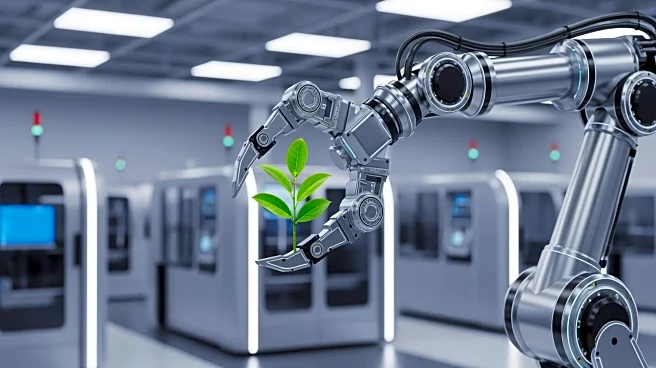What's Happening?
The Manufacturing Leaders’ Summit 2025, now in its 17th year, gathered industry leaders, executives, and decision-makers to discuss the future of manufacturing. The summit focused on practical solutions
and industry-leading insights, featuring high-caliber speakers and interactive sessions. Key topics included the role of data and AI in transforming manufacturing, sustainable practices, and the importance of fostering a culture that supports digital transformation. Asif Moghal from Autodesk emphasized the need for effective data management to leverage AI, while Leonardo's Rob Armstrong and Sarah Gobind-Cook presented their sustainability strategy aimed at achieving net zero emissions. The summit underscored the importance of innovation, collaboration, and continuous improvement in driving industry progress.
Why It's Important?
The discussions at the summit are crucial for the U.S. manufacturing sector as they highlight the need for embracing digital transformation and sustainability. Effective data management and AI integration can significantly enhance productivity and innovation, providing a competitive edge in the global market. The focus on sustainability aligns with growing environmental concerns and regulatory pressures, encouraging manufacturers to adopt greener practices. By fostering a culture of continuous improvement and collaboration, the industry can address challenges such as labor shortages and skills gaps, ensuring long-term growth and resilience.
What's Next?
Manufacturers are expected to increasingly invest in digital technologies and sustainable practices following the summit's insights. Companies may prioritize data management strategies to fully leverage AI capabilities, while also focusing on reducing emissions and enhancing resource efficiency. Collaboration with platforms like EcoVadis and JOSCAR Zero could become more common as firms seek to decarbonize their supply chains. The emphasis on cultural transformation suggests that organizations will work towards engaging employees and aligning strategies with everyday operations to drive successful change.
Beyond the Headlines
The summit's focus on AI and sustainability reflects broader industry trends towards digitalization and environmental responsibility. As manufacturers adopt these practices, they may face ethical considerations related to data privacy and the impact of automation on the workforce. The shift towards sustainable manufacturing could also influence consumer preferences, with increasing demand for eco-friendly products. Long-term, these developments could lead to a more resilient and innovative manufacturing sector, capable of adapting to future challenges and opportunities.










